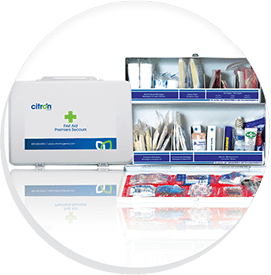Table of Contents
Last Updated on September 30, 2022
Accidents, ranging from a minor paper cut to a significant heart attack, are inevitable. However, mishaps can be prevented when the proper safety measures are in place. The Occupational Safety and Health Association (OSHA), requires establishments to implement preventative measures such as floor mats and first aid kits, and strongly recommends automated external defibrillators (AED).
Safe, Non Slip Floors
Businesses are required to maintain risk-free floors. Per OSHA, “Walking-working surfaces are maintained free of hazards such as sharp or protruding objects, loose boards, corrosion, leaks, spills, snow, and ice.” Slips, trips, and falls are one of the most common types of workplace accidents. According to OSHA, over 17% of them end up as “disabling occupational injuries.” Most industries experience 20.1 falls per 10,000 employees; however, this can be higher. Matting at an entryway can absorb approximately 80% of the moisture and dirt off of an individual’s shoes, keeping common-area floors cleaner, safer, and drier.
In addition to slip and fall risks in common areas, there are about 40,000 toilet-related accidents each year. Hand washing, urinal usage, and squatting over toilets (a survey found that 88.9% of women do this) all cause floors to become wet. Placing non-slip, polypropylene mats underneath sinks, urinals, and around toilets can absorb spills and prevent hazardous puddles.
Immediate First Aid Assistance
OSHA has mandated that businesses make first aid available to their employees. “In the absence of an infirmary, clinic, or hospital in near proximity to the workplace which is used for the treatment of all injured employees, a person or persons shall be adequately trained to render first aid. Adequate first aid supplies shall be readily available.”
The Bureau of Labor Statistics reported that in 2015, there were 2,905,900 total cases of nonfatal injuries and illnesses in the workplace, many of which needed first aid care. Due to the different hazards workers may encounter, first aid kit requirements can vary between industries. Thus, providing a quality kit that exceeds the necessities may prove to be safer and smarter.
Prepared for the Unexpected with an Automated External Defibrillator
Around 350,000 people each year experience an abrupt loss of heart function known as sudden cardiac arrest (SCA). About 95% of individuals who experience SCA die from it, often because they do not receive the combined aid of cardiopulmonary resuscitation (CPR) and an automated external defibrillator (AED). For each minute that passes without help, the chances of recovery decrease 7-10%, but when an AED is used during the first 3-4 minutes of SCA, the survival rate increases by as much as 60%. AEDs are highly recommended in all workplaces by OSHA and the American Heart Association.
Success may seem like every business’s primary goal; however, safety is equally important. Put the wellbeing of your customers and employees first! Contact Citron Hygiene to enquire about our floorcare and first aid solutions.
Related posts:
- Preparation Makes Businesses Safer
- 5 Ways to Save Costs in the Washroom
- 5 Ways to Save Costs in the Restroom
- Hygiene Tips for Your Business: Hair and Nail Salons
- Hygiene Tips for Your Business: Distribution Centers
- Hygiene Tips for Your Business: Health and Country Clubs
- How your Business can take a Stand Against Period Poverty
- Beyond the Pride Flag: Is Your Business Providing an Inclusive Space Year-Round?
